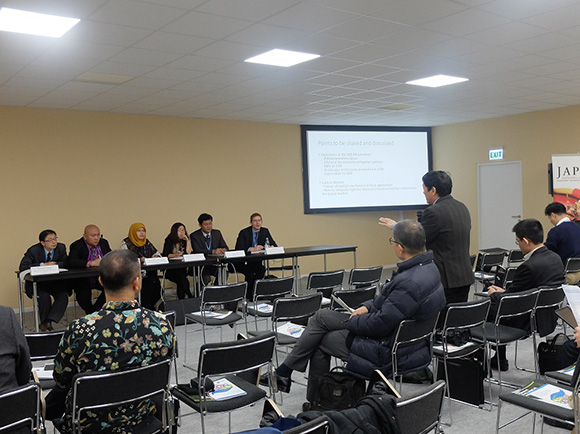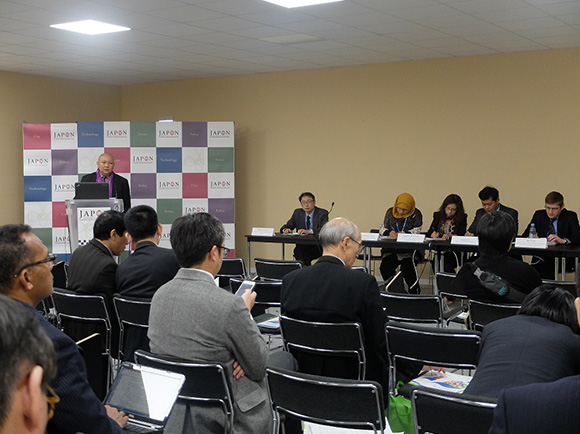Seminar on Experience from South East Asian countries to reduce GHG emissions through Joint Crediting Mechanism (JCM)
JICA Indonesia Office
Outline
JICA’s technical assistance on Capacity Development for Low Carbon Development in the Republic of Indonesia is supporting the operation of Joint Crediting Mechanism. This seminar aims to share the experience and lessons learned from Climate Change Mitigation Policies and Actions through JCM in South East Asia region. Discussion will be provided by policy makers and experts in the region such as Indonesia, Cambodia and Viet Nam.
Program
-
- Opening Remarks
- Takeshi Nagasawa, Ministry of Economy, Trade and Industry (Japan)
Rizal Edwin Manansang, Coordinating Ministry for Economic Affairs (Indonesia)
-
- Recent Development of The Joint Crediting Mechanism (JCM)
- Toshiaki Nagata, Ministry of Economy, Trade and Industry (Japan)
-
- Indonesia experiences on JCM development and its possible cooperation with other ASEAN countries
- Dicky Edwin Hindarto, Indonesia JCM Secretariat (Indonesia)
-
- Discussions: JCM Experience in the ASEAN countries
-
- [Discussants]
- Nguyen Thanh Hai, Ministry of Natural Resources and Environment (Viet Nam)
Kamal Uy, Ministry of Environment (Cambodia)
Ian Trim, Department of Energy and Climate Change (UK)
- [Moderator]
- Yuana Rochma Astuti, Coordinating Ministry for Economic Affairs (Indonesia)
-
- Q&A
Summary
Opening Remarks
Mr. Takeshi Nagasawa, Director for Global Environment Partnership Office, Ministry of Economy, Trade and Industry (METI), introduced that JCM had been clearly mentioned in Japanese INDC, and JCM had been developed steadily with growing number of agreement countries.
Dr. Rizal Edwin Manansang, Coordinating Ministry for Economic Affairs, Indonesia, explained the summary of current status of Indonesia JCM, and expressed Indonesia's willingness to work harder for further development of JCM.
Presentations
Mr. Toshiaki Nagata, METI, introduced roadmap of JCM, relationship between UNFCCC framework and JCM, status of JCM in Japan INDC, and establishment and operation of Japan JCM Registry as recent news. He also explained key features of JCM support scheme by METI.
Mr. Dicky Edwin Hindarto, Indonesia JCM Secretariat, explained progress of Indonesia JCM activities, status of JCM in Indonesian INDC. Considering that 6 countries in ASEAN region (60% of total number of ASEAN member countries) are JCM partner countries at present, he proposed possibility for cooperation within the region (capacity building for JCM, methodology development, and financing through multilateral organization such as Asian Development Bank).
Discussion (Moderator: Ms. Yuana Rochma Astuti, Coordinating Ministry for Economic Affairs, Indonesia)
Ms. Nguyen Thanh Hai, Ministry of Natural Resources and Environment, Viet Nam presented expectations to JCM such as financial and technical support from Japan, introduction of low carbon development technologies, promoting domestic low carbon development policy implementation. She also raised the challenges to be addressed such as low recognition on JCM due to newly introduced scheme, unproven technical guideline for JCM, and unclear treatment of credits. Mr. Kamal Uy, Ministry of Environment, Cambodia introduced progress of JCM in the country, as well as the common issues to the mitigation policies including JCM such as data collection and quality, difficulty of methodology and MRV development, financial and technical support gaps, needs for capacity development of stakeholders for related systems such as GHG inventory. Mr. Trim, Head of Global Carbon Markets, Department of Energy and Climate Change, UK, referred that expectations to the carbon emissions trading schemes were still remaining regardless of current slump of global carbon market. And based on the UNFCCC negotiation, he reminded that those schemes will be required to establish common appropriate rules (e.g. how to avoid double counting), and construct an international supervision system for their transparency.
Q&A session
Q (Viet Nam (government)): Is there any possibility for a project which is not only for mitigation but also for adaptation?
A (Mr. Nagata): Japanese government has been recognizing importance of adaptation measures and has different supporting schemes. In terms of JCM, it is firstly for GHG reduction, and a project needs to prove that it will reduce GHG emissions. However, we do not deny for a project to have co-benefits as an adaptation measure.
Q (Viet Nam (government)): What are the most important lessons learned from JCM implementation including Indonesian success of JCM?
A (Mr. Dicky): Firstly, communication or mutual understanding is important. We realize that the most difficult challenges of JCM are communication among project participants from both countries. And secondly, to make linkage between local policies and a JCM project.
A (Ms. Hai): We agree that communication is important. Although Viet Nam does not have large numbers of projects at this moment, but we can propose that balance between quality of technologies and appropriateness of those price will become a big issue, and sufficient communication is required among project participants.
Key Messages
- JCM has significant status as a domestic mitigation measure. For example, JCM is clearly mentioned in Japan’s INDC, and it is assumed as an example of carbon market mechanisms in Indonesian INDC.
- JCM is basically bilateral cooperation, however each JCM has a common framework. There is possibility for ASEAN region to cooperate in some areas such as capacity development on JCM scheme and methodology development.
- UNFCCC discussion also suggests the necessity for various mitigation mechanisms including JCM to establish common appropriate rules, and to develop an international supervision system.
Photograph
Reporters
Noriko Hase, Jun Ichihara, JICA Indonesia Office (Project of Capacity Development Assistance for Low Carbon Development)








